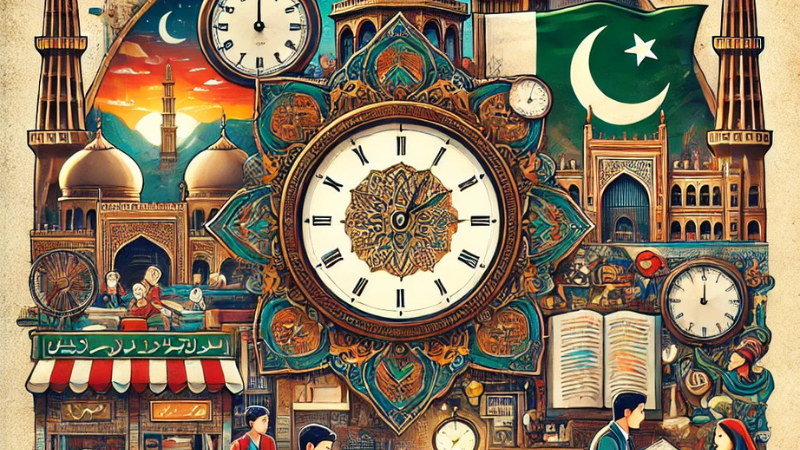The Importance of Time in Pakistani Culture: 10 Powerful Ways It Shapes Traditions and Values
Introduction
Time holds a unique place in the cultural fabric of Pakistan, where it intertwines with traditions, societal norms, and daily practices. The value placed on time varies across regions, professions, and personal habits, but it remains a defining characteristic of the nation’s ethos. From the bustling cities to the quiet rural landscapes, the significance of time is acknowledged in various forms whether through punctuality, time-bound rituals, or the concept of ‘Pakistani Time.
‘ In this article, we will explore 10 powerful ways the importance of time manifests in Pakistani culture, shedding light on how it influences everything from economic activities to family gatherings, and even religious observances. By understanding these dynamics, we can better appreciate the deep-rooted cultural values that guide the rhythms of life in Pakistan.
Table of Contents
The Importance of Time: In Pakistani Culture
The concept of the importance of time varies from culture to culture, but it holds a special place in Pakistani culture. Time is not only an important component of our daily lives, but it also affects our social norms, business activities, and family relationships. In this article,

1۔ Cultural background
The culture of Pakistan includes different nationalities, languages, and traditions. The concept of punctuality is seen in different ways in different regions. In urban areas, especially in big cities like Karachi and Lahore, people understand the importance of time and are punctual on various occasions. In rural areas, punctuality is relaxed, where people are usually not punctual. Also common here is the term Pakistani time, which is a cultural custom of arriving a little later than the scheduled time.

2۔Economic activities
The importance of time increases especially in economic activities. In the business world, punctuality is taken seriously. Timely transportation to and from meetings, contracts, and business activities is critical. Timely decisions are the key to business success. In big companies, employees are told the importance of punctuality so that they can be effective in their work.

3۔Time in educational institutions
Punctuality is very important in educational institutions. In school and college, students are taught to plan time. Punctuality makes the learning process effective, and it also increases the discipline of the students. Time planning is important when preparing for exams and completing homework, which is essential for their future success.

4۔Social and family traditions
Family gatherings and social occasions have certain punctuality characteristics. During Eid, wedding, and other festivals, people usually arrive a little later than the scheduled time. This is a common practice in Pakistani society. In keeping with the tradition of hospitality, although punctuality is relaxed, it is also important that people arrive on time for important occasions.

5۔Time sequence
With the coming and going of different seasons in Pakistan, the time order also changes. In winter people sleep longer while in summer there is a tendency to wake up early. These habits affect the importance of time in daily life. During festivals, people perform time-specific rituals, which reflect cultural traditions.

6۔The impact of technology
In modern times, technology has had a positive impact on punctuality. People can plan their activities through smartphones and various applications. With the help of calendars and task management apps, individuals can manage their activities. This technology not only helps in time planning but also inculcates the habit of punctuality.

7۔Challenges and solutions
There are various challenges regarding punctuality in Pakistan. Problems with public transport, delays at government offices, and unavailability of other services hamper punctuality. Better planning, public awareness, and quality service delivery are needed to address these challenges. Punctuality problems can be solved if government and people work together.

8۔Psychological aspects
The psychological aspect of punctuality is also important. Punctuality inculcates the qualities of discipline, responsibility, and professionalism in a person’s personality. A person who is punctual becomes an exemplary example for others. On the contrary, non-punctuality creates disorder, which can cause problems in various areas of life.
9۔Concept of Pakistani Time
The concept of “Pakistani Time” is particularly important in Pakistani culture. This is the term usually used for when people arrive a little later than the scheduled time. This is a fact that is seen everywhere, be it the opening of an event or a business meeting. This concept means that people are sometimes lax about punctuality, and this is part of cultural traditions.
10. Religious and Spiritual Significance
Time holds significant importance in Islamic practices, which is deeply rooted in Pakistani culture. Observing prayer times, fasting during Ramadan, and attending congregational prayers are all time-sensitive practices that reinforce punctuality and discipline. For Muslims in Pakistan, adhering to these scheduled times is a spiritual responsibility and a way to maintain a connection with faith and community. In this context, time is viewed not just as a practical resource, but also as a sacred element to be respected and valued.

Result
The importance of time occupies a prominent place in Pakistani culture. It brings discipline to our daily life and is the key to success in various social and economic situations. Although concepts of punctuality vary, it is important for everyone to understand the importance of punctuality and incorporate it into their lives.
One positive effect of the importance of time in Pakistani society is that people can organize their work better. Efforts to learn punctuality not only pave the way for individual development but also contribute to social development.
Therefore, it is everyone’s responsibility to understand the importance of time and incorporate it into our lives, so that we can improve our lives. It will be beneficial not only for us but also for our society.
————————–
You May Also Like:


